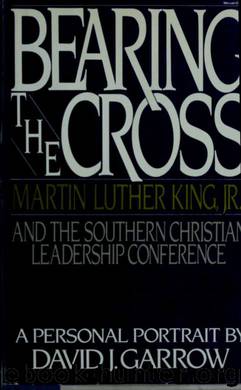Bearing the cross by David J. Garrow

Author:David J. Garrow
Language: eng
Format: epub
Tags: King, Martin Luther, Jr., 1929-1968, Southern Christian Leadership Conference -- History, African Americans -- Biography, Civil rights workers -- United States -- Biography, Baptists -- United States -- Clergy -- Biography, African Americans -- Civil rights -- History -- 20th century, Civil rights movements -- United States -- History -- 20th century, United States -- Race relations
Publisher: 1st ed
Published: 1986-03-13T16:00:00+00:00
406 Bearing the Cross
Johnson concluded by saying he had advised Governor Wallace to do three things: declare his support for universal suffrage; assure the right of peaceful assembly in Alabama; and hold biracial meetings with his state's citizens. Wallace had no comments, and after Johnson was finished, Attorney General Katzenbach briefed the reporters on the final draft of the voting rights bill, which had been completed only hours earlier. 49
Martin King, buoyed by Johnson's remarks but depressed by the movement's internal tensions, returned to Atlanta Saturday before flying to Chicago for a speech. On Sunday evening Lyndon Johnson phoned King to invite him to the voting rights address that he, Johnson, and the congressional leadership had agreed he would deliver to a nationally televised joint session of Congress on Monday night. King thanked him for the courtesy but declined, since he had to be back in Selma Monday to preach at a memorial service for James Reeb. The service was held on the steps of the Dallas County courthouse. It was the first time in six days that movement supporters had been allowed to protest outside the Brown Chapel neighborhood, or that Martin King had appeared publicly in Selma. More than two thousand marchers made their way to the pale green building, where King, flanked by church leaders, union presidents, and U.S. congressmen, presided over a twent\ -minute service. King spoke to the crowd about "the agonizing loneliness that characterizes the life of the pioneer,*' the same theme he had sounded in Chicago, where he had told an audience that "you can never know the agonies and the lonely moments of leadership."
Monday evening a nationwide television audience of seventy million people watched Lyndon Johnson give his address. The memorable speech marked the first time in nineteen \ears that an American president had personally presented a special message to Congress on a domestic issue. Johnson reviewed the events in Selma. noting that the protests and their violent reception sprang from the long history o\ black disfranchisement in the South. "It is wrong—deadly wrong.*' he said, "to deny any of your fellow Americans the right to vote in this country." The Congress should approve the administration's new bill with no delay and no hesitation because "outside this chamber is the outraged conscience of a nation." Johnson endorsed the Selma demonstrations, saying that the black American's "actions and protests, his courage to risk safety and even to risk his life, have awakened the conscience of this nation." Selma, he said, was a milestone in the nations development comparable to Lexington, Concord, and Appomattox, one of those events where "history and fate meet at a single time in a single place to shape a turning point in man's unending search for freedom." Then, Lyndon Johnson uttered the movement's slogan, vowing that "we shall overcome" America's "crippling legacy of bigotry and injustice." Listening to the president's repeated invocation of that hallowed phrase as he watched in the Jacksons' living room, Martin King was overcome by emotion.
Download
This site does not store any files on its server. We only index and link to content provided by other sites. Please contact the content providers to delete copyright contents if any and email us, we'll remove relevant links or contents immediately.
| Military | Political |
| Presidents & Heads of State | Religious |
| Rich & Famous | Royalty |
| Social Activists |
Waking Up in Heaven: A True Story of Brokenness, Heaven, and Life Again by McVea Crystal & Tresniowski Alex(37775)
Empire of the Sikhs by Patwant Singh(23065)
We're Going to Need More Wine by Gabrielle Union(19028)
Hans Sturm: A Soldier's Odyssey on the Eastern Front by Gordon Williamson(18561)
Leonardo da Vinci by Walter Isaacson(13300)
The Radium Girls by Kate Moore(12009)
Tools of Titans by Timothy Ferriss(8357)
Educated by Tara Westover(8040)
How to Be a Bawse: A Guide to Conquering Life by Lilly Singh(7464)
Permanent Record by Edward Snowden(5822)
The Last Black Unicorn by Tiffany Haddish(5621)
The Rise and Fall of Senator Joe McCarthy by James Cross Giblin(5264)
Promise Me, Dad by Joe Biden(5137)
The Wind in My Hair by Masih Alinejad(5084)
A Higher Loyalty: Truth, Lies, and Leadership by James Comey(4942)
The Crown by Robert Lacey(4795)
The Iron Duke by The Iron Duke(4341)
Joan of Arc by Mary Gordon(4088)
Stalin by Stephen Kotkin(3949)
